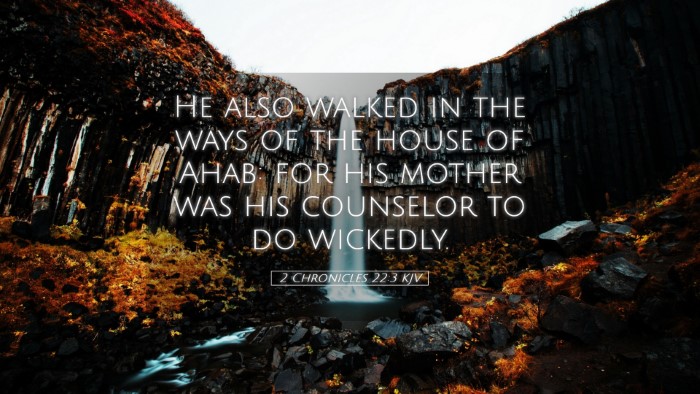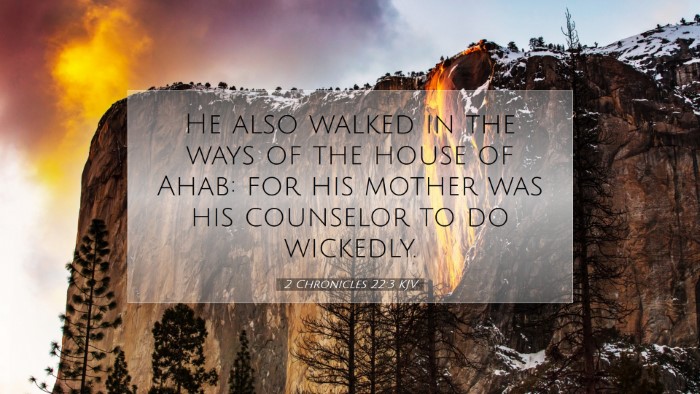Commentary on 2 Chronicles 22:3
Verse: "He also walked in the ways of the house of Ahab; for his mother was his counsellor to do wickedly." - 2 Chronicles 22:3
Introduction
This verse introduces a critical turning point in the history of Judah, emphasizing the impact of familial influence on the pursuit of righteousness versus wickedness. The actions of King Ahaziah, influenced by his mother Athaliah and the legacy of Ahab, set the stage for understanding the ongoing struggle between faithfulness to God and compromise.
Historical Context
The backdrop of this verse is the divided kingdom of Israel and Judah. After the reign of Jehoshaphat, a largely righteous king, the throne of Judah fell to his son Ahaziah, who was significantly influenced by the wicked practices of the northern kingdom’s royal family. Understanding the historical context in which these kings ruled aids in grasping the full implications of their actions and decisions.
Spiritual Commentary
This verse highlights several poignant themes relevant for pastors, students, theologians, and scholars:
-
Influence of Family:
Ahaziah's allegiance to the ways of Ahab demonstrates how family dynamics can profoundly shape one's moral compass and decision-making processes. Athaliah, being his mother, played a decisive role in steering him towards wickedness. This brings to light the responsibilities of parents and guardians in guiding the spiritual direction of their children.
-
Wicked Counsel:
The mention of Athaliah as a counselor to Ahaziah signifies the perils of heeding ungodly advice. Athaliah, the daughter of Jezebel and Ahab, epitomizes the destructive influence of evil counsel. This aspect resonates with various biblical admonitions regarding the importance of seeking godly wisdom and the consequences of following the counsel of the ungodly (Psalm 1:1).
-
Continuation of Idolatrous Practices:
Ahaziah’s behavior showcases a worrying perpetuation of the Baal worship introduced by Ahab and Jezebel. The chronicler's focus on this aspect emphasizes the dangers of syncretism and the challenge of remaining pure in worship amid pervasive idolatry. It serves as a reminder to contemporary believers of the need to discern and guard against influences that may lead them away from true worship of God.
Insights from Commentators
Marthew Henry’s commentary reflects on the moral degradation of Ahaziah, suggesting that he inherited both the throne and the corrupt inclinations from his lineage. Henry points to the idea that “he walked in the ways of the house of Ahab,” highlighting the detrimental impact of legacy.
Albert Barnes emphasizes the phrase “for his mother was his counsellor to do wickedly,” interpreting it as a powerful warning about the influence of especially mothers in shaping the character of future generations. He notes that Ahaziah’s decisions were not made in a vacuum but were heavily colored by the evil advice he received.
Adam Clarke provides deeper insights by comparing Ahaziah’s fate with other biblical figures; he explains that the momentum of wickedness can easily engulf those who fail to seek divine guidance. Clarke’s perspective illustrates that morality is often a community and familial inheritance, which calls for a vigilant approach to the upbringing of future generations.
Theological Implications
This verse invites deep theological reflection on the nature of sin and its progression through familial ties. It raises questions about personal sin, corporate responsibility, and the dynamics between individual choice and inherited behavior.
-
Intercessory Prayer and Influence:
The controversy surrounding Ahaziah forces us to consider the role of prayer and intercession in the face of such influences. Can godly counsel prevail against the tide of wicked advice? The answer lies in the commitment of faithful believers to pray for those under the sway of ungodly influence.
-
The Cost of Compromise:
Demonstrating how the relationship Ahaziah maintained with Ahab’s house leads to his downfall presents a crucial lesson in the high cost of compromise. Pastors and theologians are reminded that any deviation from God’s commandments invites adverse consequences, resonating with the broader biblical narrative of judgment upon nations and individuals who forsake their covenant loyalty.
Conclusion
2 Chronicles 22:3 serves as a poignant reminder of the significant role that family and counsel play in shaping moral and spiritual paths. It calls believers to be vigilant in guarding against influences that lead away from God, model holy living for the next generation, and actively seek divine wisdom in decision-making processes. The implications of this verse stretch far beyond the historical context, offering a rich tapestry of spiritual insights valuable for the contemporary church.


